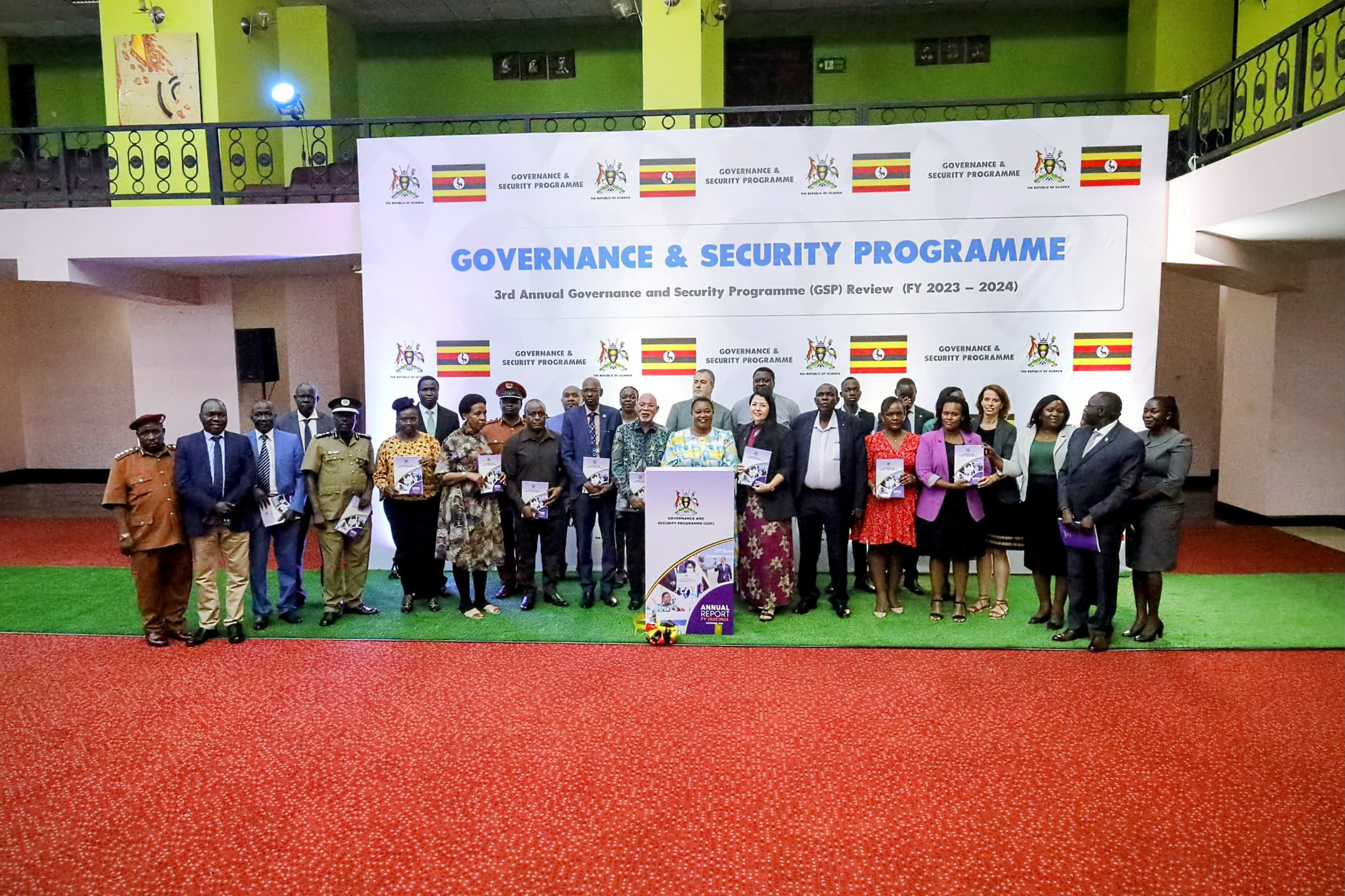
Good governance security, and peace promote transparency, accountability, and efficient resource management creating a safe and conducive environment for investment and economic activity. Good governance and the rule of law build strong and reliable institutions.
The country has invested in modernizing its security forces by incorporating advanced technology and improved training programmes to better respond to internal and external threats. The country has invested in security apparatus including
more sophisticated intelligence networks and border control mechanisms.
The Security forces and agencies consistently maintained high levels of combat readiness and response to emerging security threats, impressionable 90% public confidence in security system, and 80% acquisition of al equipment and skills for security. Suffice to add that a total of 3,698 personnel were recruited and 46,999 were trained in various skills and specializations. This translated to an increment of trained personnel from 38,123 in FY 2022/23 to 46,999 in FY 2023/24.
The crime rate reduced from 524 in 2022 to 502 in 2023 per 100,000 population according to the UPF Crime Report 2023. This level of performance is attributed to the use of CCTV cameras, deployment of motorized patrols and community policing.
The CCTV surveillance project has revolutionized crime response and prevention with the system being operational (Phase Il) in 71 districts, 10 cities, 20 municipalities, 35 towns, 06 border points and all major highways. The use of the Automated Fingerprint Information system (AFIS) also helped to identify repeat offenders. In addition, the implementation of the Intelligence Transportation Monitoring System (IMS) has commenced to further enhance the ability of security agencies to monitor vehicles and respond to security threats. Improvements have also been noted in staff recruitment and training, infrastructure development, and the resettlement and reintegration of veterans. Consequently, several events have successfully been hosted such as the Non-Aligned Movement and G77+China summits in January 2024.
The Programme improved the quality of life of security personnel and their families through construction of a total of 1,453 housing units by UPDF. The UPF constructed 535 staff
accommodation units for entitled lower ranks and erected 5,410 (84%) double occupancy uniports as emergency relief houses, while the construction of 2 police apartment blocks in Entebbe and Jinja, with each block containing 120 units is at 95% completion. Also undertaken is the Phased renovations of housing units in Mbale, Jinja, Gulu, Soroti and Entebbe police barracks including replacement of asbestos.
The Programme invested in the construction of justice centers thus increasing the number of districts with one-stop frontline JLOS service points from 92 to 94 out of the targeted 117 districts. The Construction of the ILOS house launched on 10th June 2022 is now at 75%
complete. It is estimated to be completed by the first half of 2025.
NIRA registered 27,524,720 citizens and assigned them National Identification Numbers,
representing 59.997% against the target of 60.2% of the national Population of 45.9 million
(UBOS 2024) and issued out 17,788,643 (72%) National ID cards to eligible citizens of 16 years and older.
NIRA registered 653,923 of the 1,400,00 births which was 131% performance against the targeted 500,000. The good performance was attributed to the strengthened collaboration with the Ministry of Health and Local Governments as well as intervention from development partners.
The Programme through DCIC processed 314,753 passport applications and issued
284,175 passports including 169,627 (60.22%) to female applicants and 115,051 (39.9%) to male applicants. The decentralization of services has eased the access of Citizenship and Immigration Control services.
To strengthen and control trans-border security, the EAC Strategic Framework on Transboundary Security was approved by the 45th Council. The framework will integrate transboundary communities into regional security arrangements in a structured manner as a panacea to the challenges created by the long porous borders which have community presence.
On 23 February 2024, the FATF Plenary agreed to remove Uganda from the list of Jurisdictions under increased monitoring (Grey List). Removal off the FATF Grey-List is of enormous national importance. As a result of this, Uganda’s country reputation was enhanced, international scrutiny and due diligence reduced, hence easing transacting. Removal from the list also lowered risk premiums and the costs of doing business, attracted more investment (both local and foreign) which subsequently spurred national economic growth.
A special audit of the Government payroll was conducted across the country. This resulted in 10,192 employees being struck off the government payroll and saving government UG 53 billion annually. There was increased implementation of corrective actions by management across votes from 64.74% to 67.77%, resulting from the conduct of follow-up audits.
Public trust ad satisfaction in the justice system is 69% according to the Justice Needs Survey Report 2024 conducted by the Hague Institute of Innovating Law (HiiL). The report shows an increase in the number of people experiencing legal problems which is reason for concern.
However, the good news is that a lot of the problems get resolved. The number of legal problems being resolved has been steadily increasing over the last 8 years. Especially notable, the number of abandoned problems has decreased compared to previous studies, meaning Ugandans are not giving up easily when trying to resolve their problems. Moreover, 69% of these resolutions are considered fair or very fair by people, which is higher than in previous years (47% in 2020).
According to statistics from the Judiciary, the proportion of case backlog cases in December 2023/24 remained at 27% despite the more than
25% growth in cases filed. This was attributed to the increase in cases disposed from 205,967 cases in 2022 to 266,323 cases in 2023 and an increase in the disposal rate of cases from 55% in 2022 to 63% in 2023.
Also, a 73.1% conviction rate was registered due to improved investigations and strong coordination. We estimate that the continued use of correctional approaches in rehabilitation of inmates will lead to a further reduction in recidivism rates to under 13% at the end of the financial year 2023/24. Further, pre-trial detainees reduced from 48.5% in June to 47.2%. This is attributed to increased disposal of cases now at 63%. In addition, increased use of non-custodial punishment such as community service has reduced the inflow of convicted people into prisons.
The Programme also launched the 2025/26 General Elections Roadmap which is phased out overthree Financial Years. The roadmap provides a basis for better planning, implementation, benchmarking and performance assessment of the 2025/2026 General Elections.
Uganda hosted 1,702,278 forced migrants including 45,855 asylum seekers, 91% of whom live in settlements in thirteen rural refugees hosting districts and 9% in urban Kampala. The refugees are mainly from South Sudan (56%) and the Democratic Republic of Congo (31%), while the remaining 13% are from 31 other countries. Women and children make up 81% of the population, older adults (60 years and over) 3%, and youth (15-24 years) 25%, under 18 years 55%, and 51% are female as of June 2024 and the numbers continue to rise every day.
Uganda successfully hosted the Non-Aligned Movement (NAM) Summit from 15th to 19th January 2024 and the 3rd South Summit (G77+China), held from 20th to 22th January,
2024. Hosting these summits will stimulate Uganda’s economy through tourism, trade and investment and boost our international image and other global interests.
Challenges in the reporting period that need to be addressed included:-
The low staff numbers across the Programme institutions. Failure to address staffing has far-reaching implications and may reverse the gains made over the years.
Increased prisoner population and Congestion in Prisons that exceeds carrying capacity by more than double. This may be addressed party through expanding carrying capacity and crime prevention measures, in addition to focusing on alternative modes of punishment such as community service away from traditional incarceration.
Limited civic and voter education: Institutions were limited from undertaking continuous education programmes by inadequate resources.
Corruption which has had a direct impact on undermining national development.

